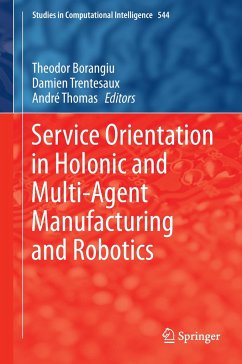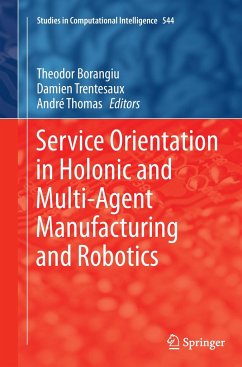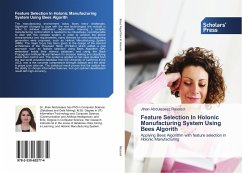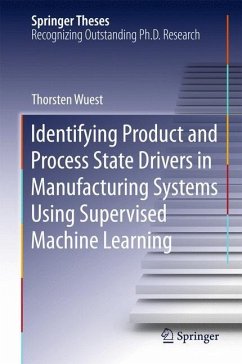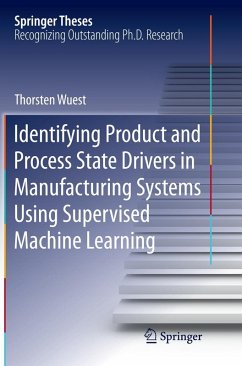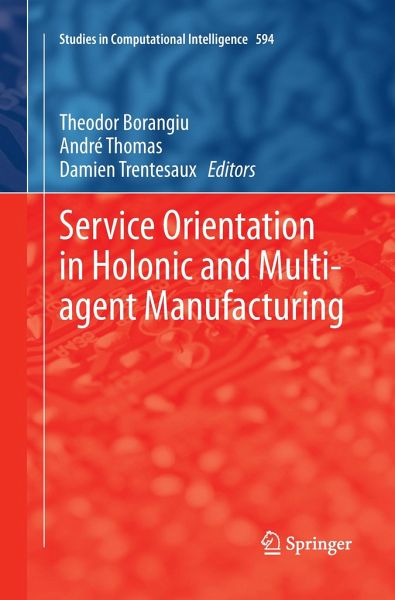
Service Orientation in Holonic and Multi-agent Manufacturing
Versandkostenfrei!
Versandfertig in 6-10 Tagen
76,99 €
inkl. MwSt.

PAYBACK Punkte
38 °P sammeln!
This volume gathers the peer reviewed papers presented at the 4th edition of the International Workshop "Service Orientation in Holonic and Multi-agent Manufacturing - SOHOMA'14" organized and hosted on November 5-6, 2014 by the University of Lorraine, France in collaboration with the CIMR Research Centre of the University Politehnica of Bucharest and the TEMPO Laboratory of the University of Valenciennes and Hainaut-Cambrésis.The book is structured in six parts, each one covering a specific research line which represents a trend in future manufacturing: (1) Holonic and Agent-based Industrial...
This volume gathers the peer reviewed papers presented at the 4th edition of the International Workshop "Service Orientation in Holonic and Multi-agent Manufacturing - SOHOMA'14" organized and hosted on November 5-6, 2014 by the University of Lorraine, France in collaboration with the CIMR Research Centre of the University Politehnica of Bucharest and the TEMPO Laboratory of the University of Valenciennes and Hainaut-Cambrésis.
The book is structured in six parts, each one covering a specific research line which represents a trend in future manufacturing: (1) Holonic and Agent-based Industrial Automation Systems; (2) Service-oriented Management and Control of Manufacturing Systems; (3) Distributed Modelling for Safety and Security in Industrial Systems; (4) Complexity, Big Data and Virtualization in Computing-oriented Manufacturing; (5) Adaptive, Bio-inspired and Self-organizing Multi-Agent Systems for Manufacturing and (6) Physical Internet Simulation, Modelling and Control.
There is a clear orientation of the SOHOMA'14 workshop towards complexity, which is a common view of all six parts. There is need for a framework allowing the development of manufacturing cyber physical systems including capabilities for complex event processing and data analytics which are expected to move the manufacturing domain closer towards cloud manufacturing within contextual enterprises. Recent advances in sensor, communication and intelligent computing technologies made possible the Internet connectivity of the physical world: the Physical Internet, where not only documents and images are created, shared, or modified in the cyberspace, but also the physical resources and products interact over Internet and make decisions based on shared communication.
The book is structured in six parts, each one covering a specific research line which represents a trend in future manufacturing: (1) Holonic and Agent-based Industrial Automation Systems; (2) Service-oriented Management and Control of Manufacturing Systems; (3) Distributed Modelling for Safety and Security in Industrial Systems; (4) Complexity, Big Data and Virtualization in Computing-oriented Manufacturing; (5) Adaptive, Bio-inspired and Self-organizing Multi-Agent Systems for Manufacturing and (6) Physical Internet Simulation, Modelling and Control.
There is a clear orientation of the SOHOMA'14 workshop towards complexity, which is a common view of all six parts. There is need for a framework allowing the development of manufacturing cyber physical systems including capabilities for complex event processing and data analytics which are expected to move the manufacturing domain closer towards cloud manufacturing within contextual enterprises. Recent advances in sensor, communication and intelligent computing technologies made possible the Internet connectivity of the physical world: the Physical Internet, where not only documents and images are created, shared, or modified in the cyberspace, but also the physical resources and products interact over Internet and make decisions based on shared communication.








